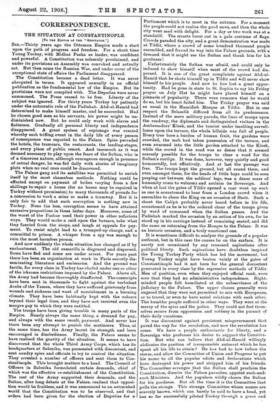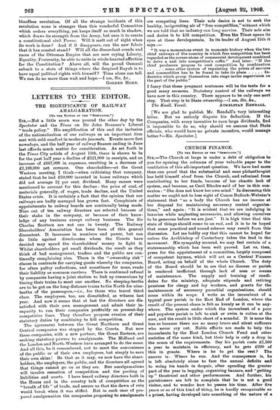CORRESPONDENCE.
THE SITUATION AT CONSTANTINOPLE.
[To THZ EDITOR OF THE "SPECTATOR-1
SIR,—Thirty years ago the Ottoman Empire made a start upon the path of progress and freedom. For a short time
Young Turkey, with Midbat Pasha as leader, was confident and powerful. A Constitution was solemnly proclaimed, and under its provisions an Assembly was convoked and actually sat. But then came the Russian War, and under cover of the exceptional state of affairs the Parliament disappeared.
The Constitution became a dead letter. It was never abrogated in terms. It appeared annually in an official publication as the fundamental law of the Empire. But its provisions were not complied with. The Deputies were never summoned. The Press ceased to be free. Liberty of the subject was ignored. For thirty years Turkey lay patiently under the autocratic rule of the Padishah. Abd-ul-Hamid had determined to make himself master, and he succeeded. Had he chosen good men as his servants, his power might be un- diminished now. But he could only work with slaves and flatterers. Gradually all personal liberty and independence disappeared. A great system of espionage was created whereby each trifling event in the daily life of every person of consequence was reported to the Palace. Spies pervaded the hotels, the tramcars, the restaurants, the landing-stages, and every place of public resort. And inasmuch as it was deemed necessary to play upon the fears of the Sultan, who is of a timorous nature, although courageous enough in presence of actual danger, he was fed daily with stories of imaginary plots when no real ones could be discovered.
The Palace gang and its satellites was permitted to enrich
itself by the most shameless methods. Nothing could be effected except on payment of bribes varying from a few shillings to repair a house (for no house may be repaired in Turkey without permission) to many thousands of pounds for a concession to work a mine or make a tramway. But it is only fair to add that such corruption is nothing new in Turkey. None the less, corruption seems to have attained excessive proportions in these latter days. Moreover, some of the worst of the Pashas used their power in other nefarious ways. They would make a raid upon the bazaars, take what they fancied from the shops, and laugh at appeals for pay- ment. To resist might lead to a trumped-up charge, and a committal to prison. A whisper from a spy was enough to ruin the most harmless person.
And now suddenly the whole situation has changed as if by enchantment. The old camarilla is disgraced and dispersed. Some have fled and some are under arrest. For years past there has been an organisation at work in Paris secretly dis- seminating literature and emissaries. And the ground was fertile, for every class in Turkey has chafed under one or other of the irksome restrictions imposed by the Palace. Above all, the Army had become thoroughly disaffected. The conscripts have been sent in thousands to fight against the turbulent Arabs of the Yemen, where they have suffered grievously from wounds and sickness and want of nourishment iu a burning climate. They have been habitually kept with the colours beyond their legal time, and they have not received even the meagre pay to which they were entitled.
The troops have been giving trouble in many parts of the
Empire. Nearly always the same thing, a demand for pay, and always with the same result, payment. And never has there been any attempt to punish the mutineers. Thus, at the same time, has the Army learnt its strength and been encouraged in disobedience. Finally, the Palace seems to have realised the gravity of the situation. It seems to have discovered that the whole Third Army Corps, which has its headquarters at Salonika, was permeated with discontent, and sent sundry spies and officials to try to control the situation. They arrested a number of officers and sent them to Con- stantinople. This brought matters to a bead. The Council of Officers in Salonika formulated certain demands, chief of which was the effective re-establishment of the Constitution. The rest of the Army supported their demands, and the Sultan, after long debate at the Palace, realised that opposi- tion would be fruitless, and it was announced to an astonished world that the Constitution was to be observed, and that orders bad been given for the election of Deputies for a Parliament which is to meet in the autumn. For a moment the people could not realise the good news, and then the whole city went mad with delight. For a day or two work was at a standstill. The streets burst out in a gala costume of flags. Crowds paraded the city, and a great demonstration was made at Yildiz, where a crowd of some hundred thousand people assembled, and forced its way into the Palaoe grounds, with' a demand that it might see the Sultan and thank him for hiss goodness !
Unfortunately the Sultan was afraid, and could only be induced to show himself when most of the crowd had dis- persed. It is one of the great complaints against Abd.ul- Hamid that be shuts himself up in Yildiz and will never show himself to his people. And now lie has lost a great oppor- tunity. Had be gone in state to St. Sophia to say his Friday prayer on July 31st he might have placed himself on a pinnacle of popularity. There were rumours that he would do so, but his heart failed him. The Friday prayer was said as usual in the Hamidieh Mosque at Yildiz. But in one respect the Selamlik differed from all its predecessors. Instead of the mere military parade, the lines of troops upon the roadway, the diplomats and distinguished visitors in the Ambassadors' Kiosk, and the tourist under insulting surveil- lance upon the terrace, the whole hillside was full of people. Every tree bore a burden of human fruit, the gardens were crowded, the mob had taken possession of the terrace, and even swarmed into the little garden attached to the Kiosk, while the crowd in the road was so dense that it seemed scarcely possible for the troops to clear a road for the Sultan's cortege. It was done, however, very quietly and good humouredly, but effectively. And at last the passage was free. The troops kept the ground, but all round them, and even amongst them, for the heads of little boys could be seen peeping out between the soldiers' legs, was a dense mass of humanity come to welcome and acclaim its Sovereign. And when at last the gates of Yildiz opened a roar went up such as one is accustomed to hear from a London crowd when it assembles to cheer the King on an occasion of State. Such a shout the Caliph probably never heard before in his life, accustomed as be is to the ordered cheer of the troops given by word of command when the Sultan passes. And the Padishah marked the occasion by an action of his own, for be stood up in his carriage instead of remaining seated, and did the same on returning from the Mosque to the Palace. It was an historic occasion, and a truly emotional one.
It is sometimes difficult to analyse the grounds of a popular outburst, but in this case the causes lie on the surface. It is surely not occasioned by any reasoned aspirations after political liberty. Such aspirations have doubtless inspired the Young Turkey Party which has led the movement, but Young Turkey might have beaten vainly at the gates of Constantinople had it not been for the general discontent generated in every class by the repressive methods of Yildiz. Men of position, even when they enjoyed official rank, were sore that they had no administrative independence. Right- minded people felt humiliated at the subservience of the judiciary to the Palace. The upper classes generally were angered that they were not permitted to mix with Europeans, or to travel, or even to have social relations with each other. The humbler people suffered in other ways. They were at the mercy of the spies and the police. They could not feel them- selves secure from oppression and robbery iu the pursuit of their daily vocations.
It was discontent against persistent misgovernment that paved the way for the revolution, and now the revolution has come. We have a people enthusiastic for liberty, and a Sovereign who professes his desire to support the Constitu- tion. But who can believe that Abd-ul-Hamid willingly abdicates the position of irresponsible autocrat which he has spent all his life to attain ? He has had to bow before the storm, and allow the Committee of Union and Progress to put his name to all the popular edicts and declarations which have destroyed his power and stripped him of his friends. The Committee arranges that the Sultan shall proclaim the Constitution, dismiss the Palace parasites, appoint such-and- such Ministers. And the populace wildly cheers the Sultan for his goodness. But all the time it is the Committee that pulls the strings. This strange Committee whose names are scarcely known, which can barely be said to have a head, yet has so far successfully piloted Turkey through a great and bloodless revolution. Of all the strange incidents of this revolution none is stranger than this wonderful Committee which orders everything, yet keeps itself so much in shadow, which draws its strength from the Army, but uses it to create a constitutional civil Power. Will it melt out of sight when its work is done ? And if it disappears, can the new fabric that it has created stand? Will all the discordant creeds and races of the Ottoman Empire that are now crying Liberty, Equality, Fraternity, be able to unite in whole-hearted affection for the Constitution ? Above all, will the proud Osmanli submit to a state of things where the despised Rayah is to have equal political rights with himself ? Time alone can tell. We can do no more than wait and hope.—I am, Sir, &c.,
GOLDEN HORN.



































 Previous page
Previous page